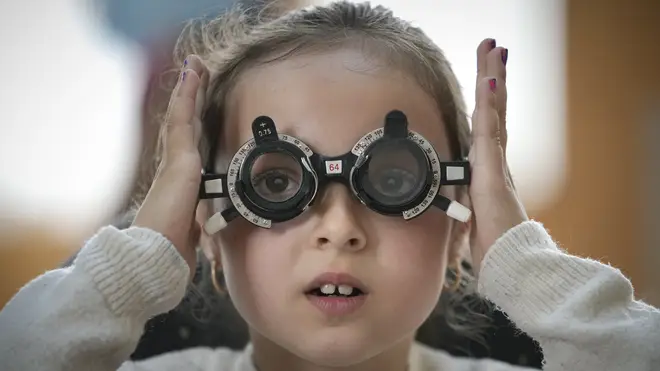
Nick Abbot 10pm - 12am
2 June 2021, 09:24

Many children in the impoverished rural community had never been screened by an ophthalmologist.
Dozens of Romanian children had their eyes examined for the first time in a remote area of the southern Carpathian Mountains.
The humanitarian organisation Casa Buna, or Good House, arranged the eye tests in Nucsoara, which comprises several villages.
Routine eye exams are recommended from early infancy, but many children in the impoverished rural community had never been screened by an ophthalmologist.
“Given that out of 30 children tested, 20 needed glasses, I think such ophthalmic caravans are needed in as many villages in the country as possible,” Mioara Marinescu, the volunteer ophthalmologist at Saturday’s event, said.
The importance of testing children’s eyes is not limited to needing corrective lenses.
Amblyopia, the condition known as “lazy eye”, is estimated to affect 1% to 5% of children worldwide, and missed cases can lead to long-term problems.
While examining children, Ms Marinescu found three with amblyopia, a disorder she says can “limit access to certain professions in adulthood.”
“Unfortunately in our country, children do not receive education or health equally,” the eye doctor said.

Valeriu Nicolae, who founded Casa Buna in 2007, comes from a poor Roma community himself.
Poor eyesight can have a serious, negative impact on children’s educational outcomes, he said.
“Teachers think the kids hate to read, but in fact, they hate to read because they cannot read because their eyesight is poor,” Mr Nicolae said.
“Kids who cannot read because their eyes are really bad are useless in the educational process.
“They get fed up and they drop out.”
The volunteer organisation supports more than 300 children and their families, putting a strong emphasis on encouraging the children to pursue education.

The group has played a prominent role in supporting children throughout the pandemic.
Casa Buna arrived in Nucsoara, 120 miles northwest of the capital Bucharest, more than a year ago.
Volunteers visit every two weeks, bringing aid to 94 children and their families.
“It was the start of the pandemic, and practically none of these kids had internet or computers.
“We put computers in all of their houses, made sure they have internet … and all they need to stay online to continue their education,” Mr Nicolae said.
Dozens of volunteers participated in the eye-screening event, including motorcyclists from the group Bikers for Humanity.
The volunteers organised activities and games to entice as many children as possible. Casa Buna also brought youngsters gifts for International Children’s Day, held on June 1.
“We’ll do (eye testing) this year in nine villages. We hope to make anywhere between 600 to 1,000 pairs of glasses,” said Mr Nicolae, whose tireless campaigning for better children’s education has won him international awards.

Romania, which has a population of more than 19 million, has the highest percentage of children at risk of poverty and social exclusion in the entire 27-nation European Union, 35.8% compared to an EU-wide average of 22.5%, according to statistics agency Eurostat.
Child poverty is most prevalent in the country’s rural communities, where one in two children lives in poverty.
“From birth, we should all have equal opportunities in education and access to health care,” ophthalmologist Ms Marinescu said.
“Regardless of the geographical area in which we are born.”